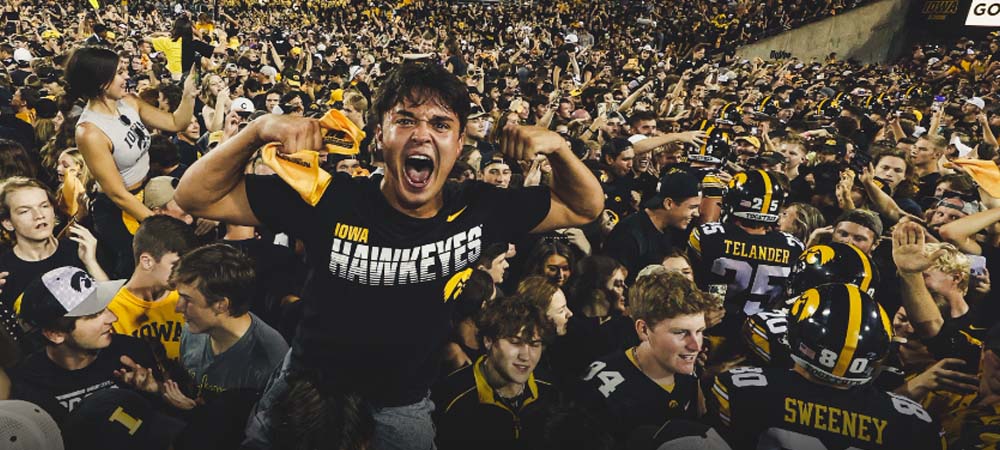- Colleges around the country are deliberating on whether to regulate or ban sports betting for their students or on their campus.
- Other colleges have fully embraced betting and have partnered with sportsbooks, some include the University of Nevada, LSU, MSU, University of Colorado, and the University of Maryland.
- The American Gambling Association has been quick to warn universities and have established a code for members of the association to follow.
WASHINGTON – A contentious issue surrounding the prevalence of sports betting at colleges/universities has administrators mulling their options. A few colleges have gone so far as to partner with sportsbooks like Caesar’s while others have restricted or even banned sports betting on their teams or on campus.
The likely solution to this problem has nothing to do with legal betting sites and everything to do with the moderate and responsible handling of the issue by the universities themselves.
The Case for Why Sports Betting Should be Allowed – But Is Partnering Going Too Far?
The simple answer as to why sports betting should be allowed on campuses and at universities is simple: colleges and universities do not have the right to tell students what they can and can’t spend their money on.
For many proponents of sports betting legalization, placing money on sports events is nothing more than entertainment, it is inherently a choice by an individual to spend their own money how they want to. However, the policy perspective is not so simple as the above quips.
That being said, colleges do have the decision of whether or not to partner with sportsbooks and the like, similar to how LSU and MSU have done with Caesar’s Sportsbook.
In general, their direct partnership means little, but concerns do start popping up with the usage of campus-wide email campaigns. This is what happened at LSU, with Caesar’s Sportsbook sending emails to anyone on LSU’s athletics email list offering a free bet for depositing and playing.
This is when would say is the moment where colleges do have to step in. Ultimately while they should have no say in the decision for their students to partake in sports betting, they should not be explicitly pushing for it either. This is especially true because most students have poor financial literacy or simply do not have much disposable income and are at higher risk to develop gambling problems.
This is all to say that the role of universities should not be to ban or restrict sports gambling, as it has proven to be a largely frivolous pursuit. In recent studies from the National Council on Problem Gambling, over three quarters of students have gambled in the past year, which is likely to trend higher due to the accessibility of apps in today’s age.
Similarly, a 2017 study showed about a quarter of athletes bet on games, despite the NCAA prohibition on it.
Essentially, because prohibitions like those from the NCAA fail to work, it would be a general waste of school resources to try and enforce a largely unenforceable policy prohibiting betting on school athletics or on campus.
Rather, schools should be using those resources to instead develop sports betting policies, as only 23% of 145 D1 public universities asked by Povich and Howard Centers reported doing so.
In addition to these policies, help centers for those that may be struggling with gambling addiction can be set up and would be a far better use of money, time, and school resources than trying to prevent an issue that is out of the university’s scope like legal sportsbooks.
Overall, the solution to the problem of sports betting in universities should be a moderate one that combines the freedom for students to do as they please and the responsibility of the college to not exacerbate or push for gambling through partnered ads or email campaigns.
Colleges should be setting up places to receive help for gambling addiction and making comprehensive policies on sports betting, but otherwise should not be directly influencing students either way.
Advertising Disclosure
In order to provide you with the best independent sports betting news and content LegalSportsBetting.com may receive a commission from partners when you make a purchase through a link on our site.
News tags: American Gambling Association | Caesars Sportsbook | LSU | MSU | National Council on Problem Gambling | NCAA | Povich and Howard Center | Purdue University | Stony Brook University | University of Colorado | University of Maryland | University of Nevada

Jeremias is a current Florida State University student majoring in Editing, Writing and Media as well as Media/Communication studies. Primarily focused on the NFL, NBA, and NHL, Jeremias has a passion for sports statistics research that helps bettors find the blind spots in sportsbooks.


 College Football Betting
College Football Betting Best Online Sports Betting
Best Online Sports Betting Best Legal NFL Betting
Best Legal NFL Betting States With Legal Sports Betting
States With Legal Sports Betting Sports Betting Events
Sports Betting Events




